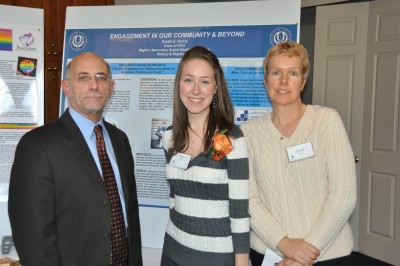
During the spring semester of her freshman year, Neag School of Education student Sarah Harris enrolled in an interdisciplinary “service-learning” honors seminar focused on migrant workers in the state of Connecticut. The course, which examined the challenges faced by migrant workers and immigrants in the state, provided Harris and her classmates opportunities to listen to experts in the fields of law, social work, medicine and education and their insights on these important issues.
Harris and her peers also worked with local support organizations in an effort to connect their textbook learning to experiences in the community. Harris was assigned to work in a seasonal homeless shelter in Willimantic.
“I had never before visited a shelter, and I recognized that this assignment would push me out of my comfort zone. Within just a few weeks, however, I began to feel comfortable in the shelter, and I began to recognize the incredibly strong community that existed among the shelter’s regular guests,” Harris recalled.
She volunteered at the shelter during the winter season of 2009 and continued volunteering for much of the 2010 season. This past June, she volunteered several days a week at the No Freeze Shelter to help hold daily office hours for guests looking for support during the summer months.
Harris helped to organize the shelter’s databases and listened to guests as they shared their stories. At the end of June, the shelter partnered with various organizations in the community to hold the Community Connections and Service Fair to support families and individuals struggling to find housing in the community, and Harris had the opportunity to participate in this event.
This fall, she’s continuing her involvement with the shelter community and is conducting a research project examining the preparation that public school teachers receive to address the unique needs of homeless students in their classrooms. The examination will serve as her University Scholar Project and her honors thesis for the Neag School.
In her university research proposal, Harris quoted American poet John Howard Payne, “Be it ever so humble, there’s no place like home.” This is the mantra for her project, recognizing that, for 1.5 million children in the United States who are homeless each year, Payne’s words fail to capture reality.
“These children have no place to call home as they move from shelter to shelter with their families or live in group homes while waiting to be placed in foster care,” she said. “They face the challenge of maintaining academic achievement with schooling that is inconsistent in location and in curriculum, while outside of school their environments are often not conducive to homework and study.”
She realizes students experiencing homelessness need extra support from schools, yet too often they get “lost in the crowd.”
Through this project, she’s seeking to examine the content and quality of preparation that public school teachers receive to help them respond to the needs of homeless students.
“Many of these individuals [at the shelter] attended school only sporadically, and some did not earn high school diplomas or GEDs until they spent time in prison or drug rehabilitation centers during their early adult years,” said Harris.
As a student majoring in secondary social studies education, history and psychology, she believes that, with a defined support and preparation program, teachers might be better able to respond to homeless students’ needs. She’ll be examining the educational implications of homelessness from historical and psychological perspectives, as well as the literature on effective educational interventions.
Using the information she gathers from her surveys and interviews with teachers and school administrators, she will work with state support agencies to create an online resource guide covering the unique issues homeless students face and exploring possibilities for teacher involvement in interventions and support systems within schools. The resource guide will be made available to school districts and educators throughout Connecticut.
Once she completes the project, she also hopes to submit her findings for presentation at the annual conference of the National Association for the Education of Homeless Children and Youth (NAEHCY). Due to her work and dedication to the homeless in Willimantic, Harris was recently honored with a Provost’s Award for Public Engagement, along with other UConn faculty, staff, students and alumni.
In a recommendation letter for the award, her faculty advisor Dr. Alan Marcus wrote, “Sarah’s continued dedication to her service and scholarship around this issue demonstrates not only an intense intellectual advancement, but sustained professional development.
“Sarah is training to be a teacher and her honors thesis work supports her continued efforts to understand and meet the needs of her students. It is clear that Sarah’s work will have an important impact on the community, particularly students,” he continued.
Her work has not only expanded upon the classroom experience, but aims to create a positive impact on the education of homeless students.
 Facebook
Facebook
 Twitter
Twitter
 LinkedIn
LinkedIn
